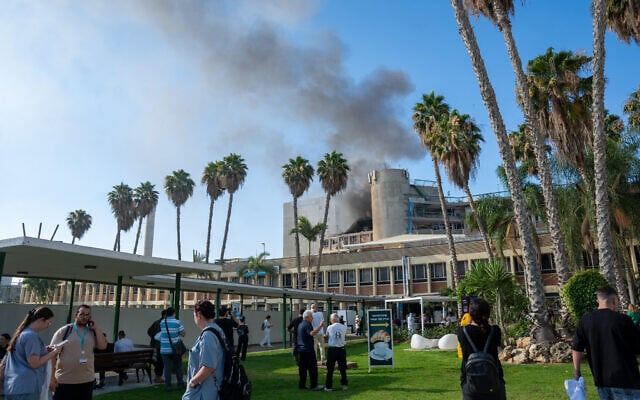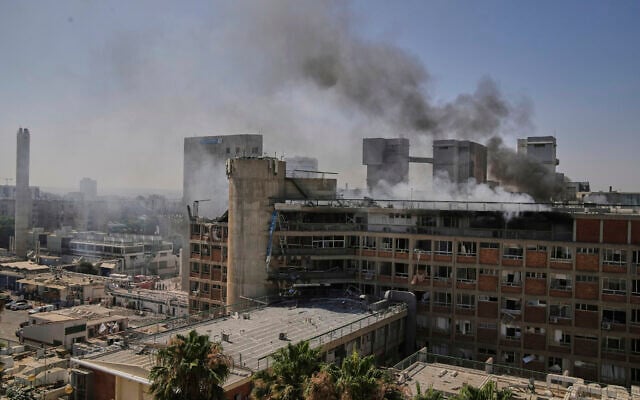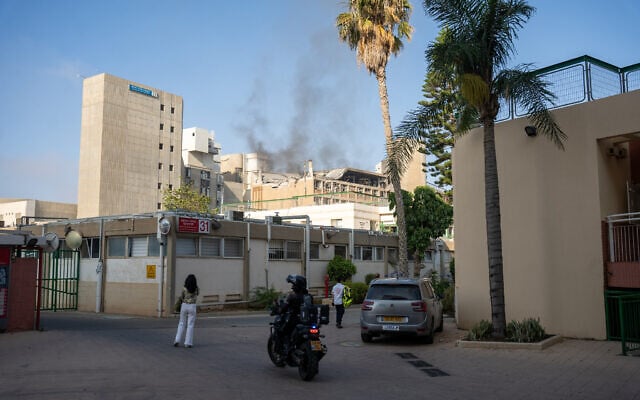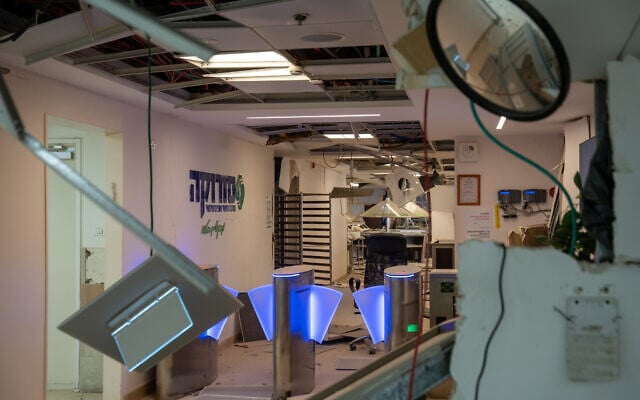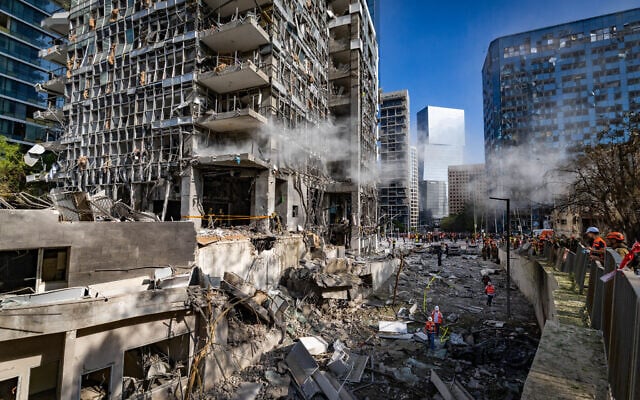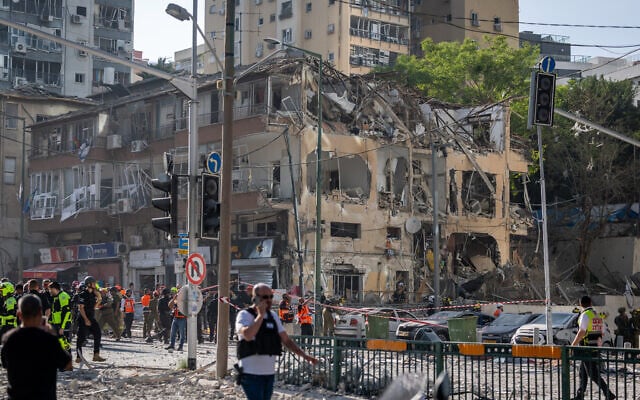


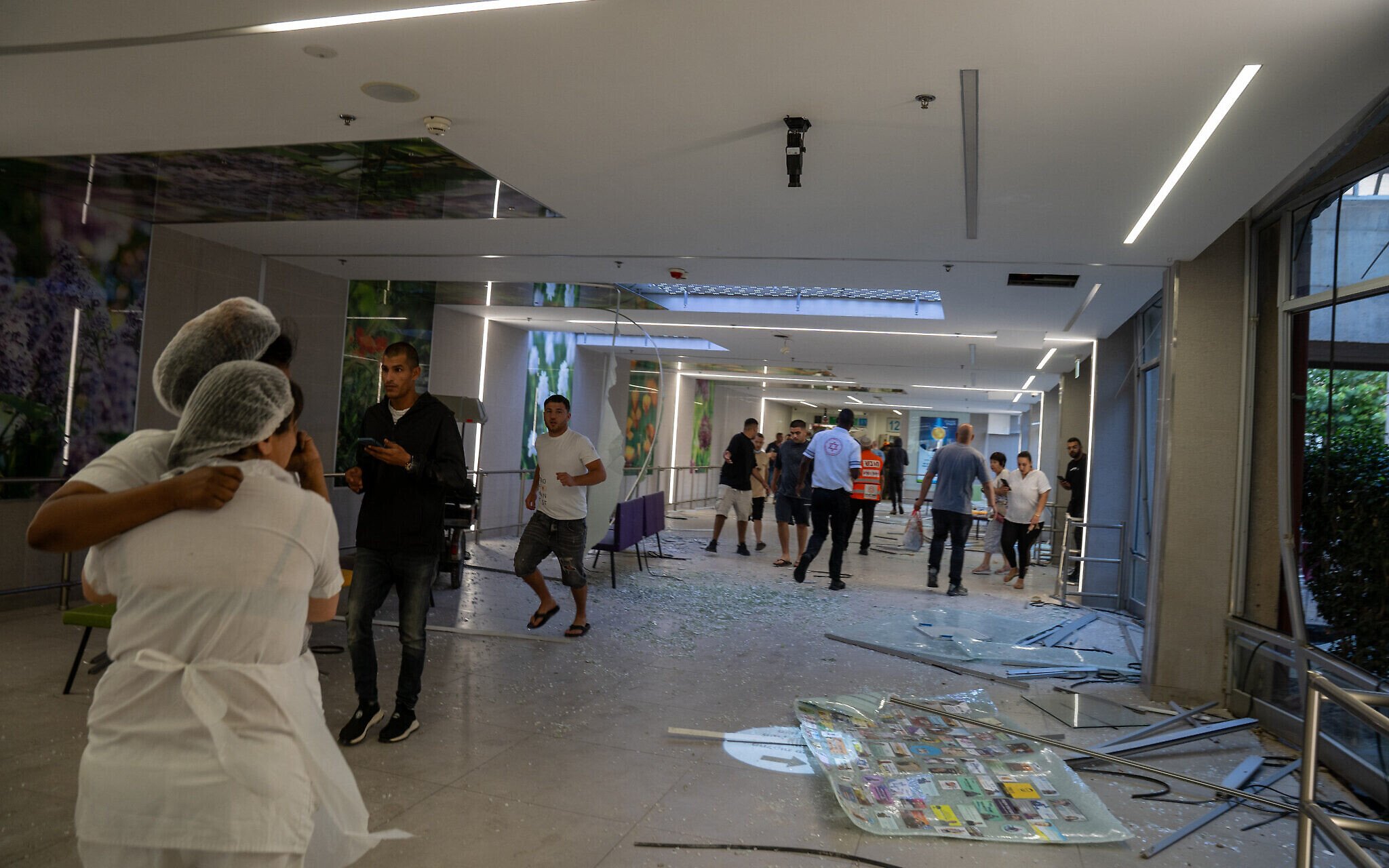
Iran fired a barrage of some 30 ballistic missiles early Thursday, scoring a direct hit on Israel’s main southern hospital, the Soroka Medical Center, and two other impacts in the central cities of Holon and Ramat Gan that wounded dozens of people, including six in serious condition.
The Magen David Adom emergency service said that a man, 80, and two women, both in their 70s, were among six people seriously hurt. Two people were moderately injured, and at least 42 others suffered light injuries from shock waves and shrapnel at the various impact sites. In addition, 18 people were lightly injured as they scrambled to bomb shelters when sirens went off.
The barrage was the latest from Iran as it bombards Israel with ballistic missiles. Israel began attacking Iranian nuclear and military sites last week, citing the immediate existential threat they pose.
Soroka Medical Center is the main hospital in Israel’s south.
The hospital’s director general Prof. Shlomi Kodesh told the media, “A missile hit the old surgical ward building at Soroka. It’s a relatively old building that had been evacuated in recent days.”
He added, “There is widespread damage to other buildings at the hospital. All patients and all staff were in shelters. The several injured we have are lightly hurt, mostly from the blast shockwave.”
Eli Bin, head of the Magen David Adom ambulance service, said a floor at Soroka that was hit had been evacuated of patients only the day before amid the war.
“Many lives were saved,” Bin said.
Iran claimed that the ballistic missile that hit Beersheba’s Soroka Hospital was aimed at an adjacent military intelligence facility.
There are no Israeli military facilities in the vicinity of Soroka Hospital. The IDF’s Southern Command base is located over two kilometers away, and there is an under-construction army base just over a kilometer away.
The hospital has over 1,000 beds and provides services to the approximately 1 million residents of Israel’s south, according to the hospital’s website.
Following the strike, the hospital was closed to all new patients except for life-threatening cases.
Many hospitals in Israel activated emergency plans in the past week, converting underground parking to hospital wards and moving patients underground, especially those who are on ventilators or are difficult to move quickly.
Footage posted to social media showed the moment of the ballistic missile impact at Soroka in the southern city of Beersheba.
A Times of Israel journalist at the scene saw staff and patients rushing through damaged, smoke-filled areas of the hospital after the attack. Police and other rescue forces arrived a short while later.
There was an initial concern that dangerous chemicals may have been released by the strike, but emergency services later said there was no danger.
Firefighters, police officers, and soldiers of the Home Front Command headed to the top floor of the building that was directly targeted in search of possible injuries. The roof had collapsed due to the missile impact, and fire began to spread in the area.
Rescue services initially suspected one person was missing; however, they were located a short while later.
Black smoke continued to rise from the building for more than an hour after the attack.
“The missile fired at Soroka Medical Center is an act of terror and crosses a red line,” Health Minister Uriel Buso said.
“It is a war crime by the Iranian regime, deliberately targeting innocent civilians and medical teams dedicated to saving lives. The Health Ministry was prepared in advance, and thanks to the immediate actions we took, a major disaster was averted,” he said.
Sarah Bushri, who volunteers at the hospital, told the Kan public broadcaster, “We heard a boom.”
“We thought that it was right inside the department. Everything came apart, glass, ceilings, everything simply fell. Luckily, no patients were injured despite the glass that shattered on their beds.”
She said staff immediately worked to evacuate the patients from the area, a process that went smoothly and without incident.
The head of the hospital’s orthopedic trauma department, Asaf Acker, told the broadcaster that the medical center had earlier evacuated patients from wards that were not fortified against rocket attacks, “and that is exactly where the missile hit.”
He said that most of the hospital was already operating from protected areas and, under instructions from the Health Ministry, had reduced its services to a bare minimum, “and that seems to have been the right step” to reduce injuries.
“There is broad structural damage. A lot of infrastructure will need work,” he said.
Over the past week, Soroka had moved its activities into underground bunkers specially designed for times of war.
In Holon, just south of Tel Aviv, a missile exploded in a residential area, serious damaging several apartment buildings.
Wolfson Medical Center in Holon said it was treating four people seriously injured in the missile strike on the city, and 16 wounded in all.
Firefighters had extricated everyone who was trapped under the rubble, the city’s fire station chief Shaul Rachamim, said.
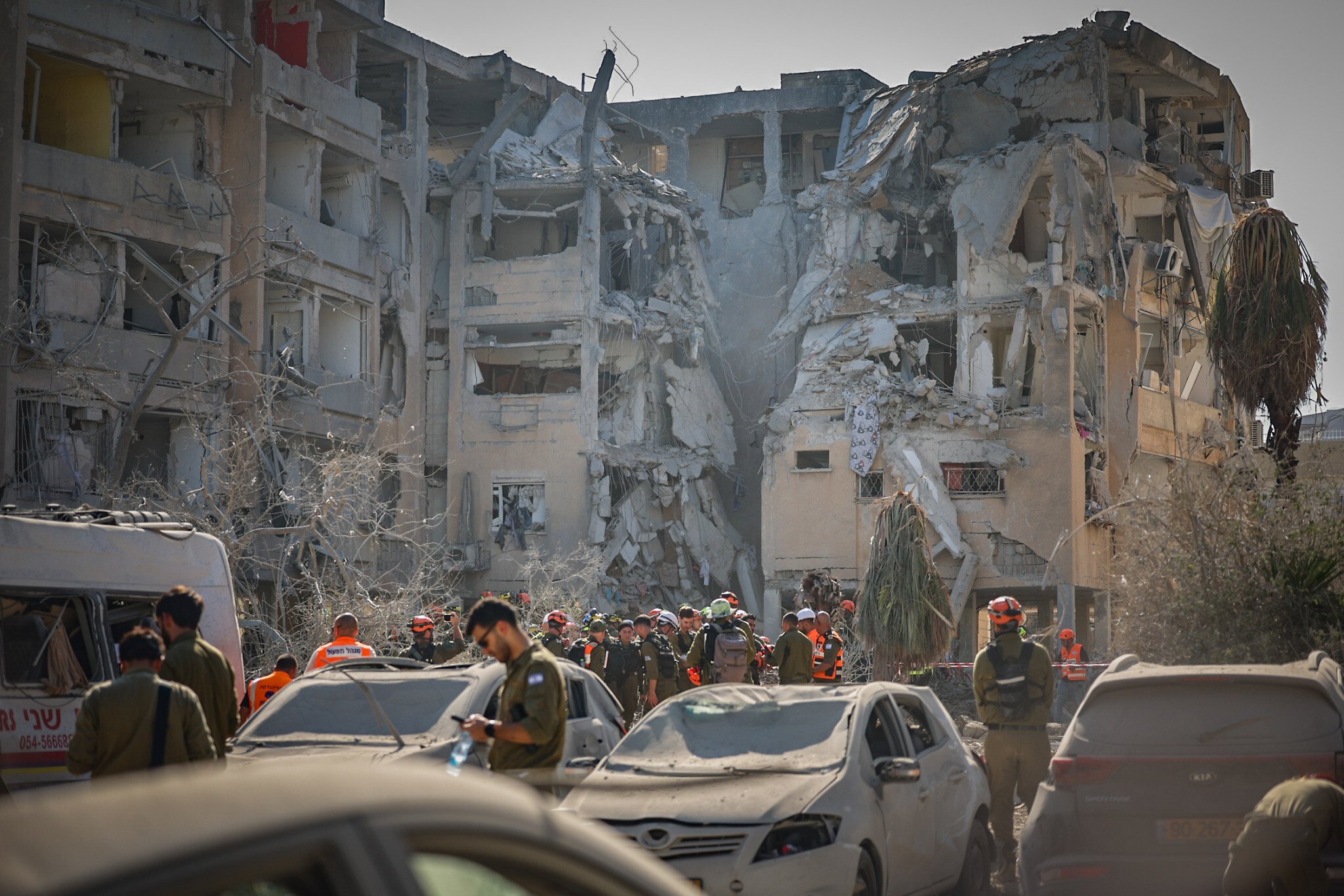
“Currently, the site is without any people still trapped. Every person we rescued has since been taken to the hospital,” he told the Kan public broadcaster.
“It is reasonable to assume, with the destruction that we’re seeing here, that these buildings will have to be destroyed,” Rachamim said.
A resident of the building that was hit told the Walla outlet that “a rocket landed in my home. We were in the shelter, and there was a boom. We smelled gas, we went outside and saw the destruction. Everything is in ruins.”
The missile hit close to a school and kindergarten, Walla reported, citing a member of staff at that facility.
“Glass shattered and buildings were damaged,” the unnamed person said. “There is also damage inside.”
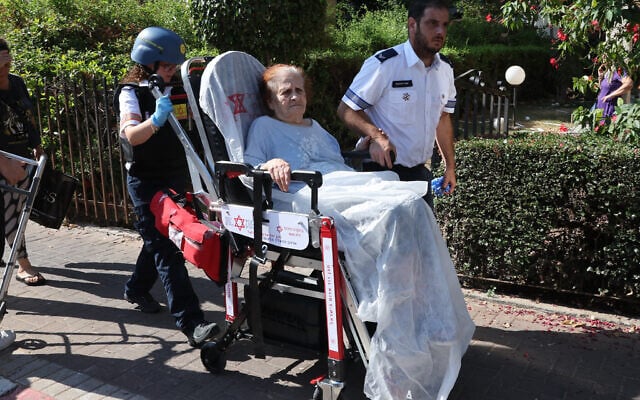
A synagogue was also damaged in the strike.
The missile that hit Ramat Gan impacted near several high-rise buildings, causing widespread destruction and seriously injuring two people and lightly injuring at least 20 others.
Adam Rosenberg, who lives close to the impact site, told Walla that he was in his safe room when he heard “a shrieking sound, like a plane. A moment later, everything shook, and a window in our home was broken.”
Video shared on social media showed a missile impact among multi-story buildings, with several of them suffering damage on numerous floors.
Rescue services were combing the area for any people who may be trapped in damaged structures.
The area hit in Ramat Gan is near the stock exchange and is one of Israel’s main financial districts.
Around a dozen mostly European and African embassies and diplomatic missions are located just a few hundred meters from the site.
A senior Kenyan official called for foreign diplomatic missions to be protected.
“Foreign missions are inviolable under international law and must be excluded and protected from armed conflict at all times,” Korir Sing’Oei, the principal secretary at Kenya’s foreign affairs ministry, told Reuters.
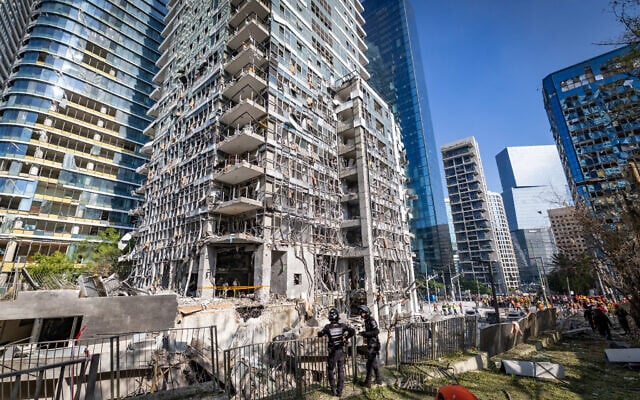
Shortly after 7 a.m., the Israel Defense Forces said it had detected the launch of ballistic missiles from Iran. The IDF later said that some 30 missiles had been fired. Several were intercepted, but three scored direct impacts in populated areas.
Iran has fired hundreds of missiles and drones at Israel in the past week, though most have been shot down by Israel’s multi-tiered air defenses, which detect incoming fire and shoot down missiles heading toward population centers and critical infrastructure. Israeli officials acknowledge it is imperfect.
The attack followed a smaller barrage at midnight. There rwee no reports of impacts in urban areas or injuries from the overnight attack, MDA reported. The IDF assessed that the barrage included a small number of missiles, all of which were apparently intercepted by air defenses.
Israel on Friday launched a campaign of airstrikes in Iran to decimate the Islamic Republic’s nuclear and ballistic missile programs, which Jerusalem characterized as an imminent, existential threat. Iran has responded with deadly barrages of ballistic missiles at civilian population centers and military targets in Israel.
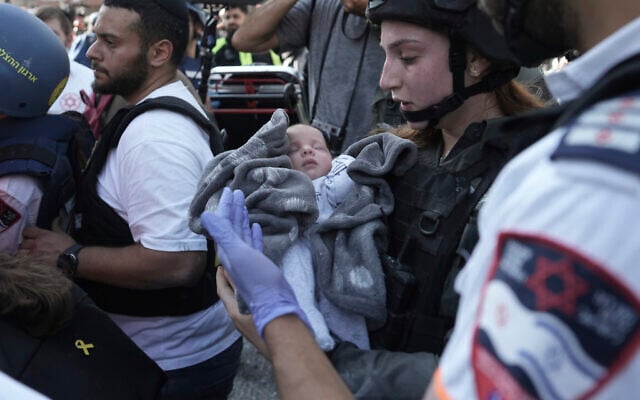
Iran, which vows to destroy Israel, has always denied any ambition to develop nuclear weapons, but its enrichment levels are far beyond any civilian purpose, and the IAEA says it has obstructed inspectors from visiting its nuclear sites.
The Thursday missile strikes came as Israel attacked Iran’s Arak heavy water reactor and other nuclear and military sites.
An Iranian state television reporter, on live in the nearby town of Khondab, said the facility had been evacuated and there was no damage done to civilian areas around the reactor. The report said there was “no radiation danger whatsoever.”
Israel had warned earlier Thursday morning it would attack the facility and urged the public to flee the area.
Israel’s seventh day of airstrikes on Iran came a day after Iran’s supreme leader rejected US calls for surrender and warned that any military involvement by the Americans would cause “irreparable damage to them.”
Israel also lifted some restrictions on daily life, suggesting the missile threat from Iran on its territory was easing.
A Washington-based Iranian human rights group said at least 639 people, including 263 civilians, have been killed in Iran and more than 1,300 wounded. In retaliation, Iran has fired some 400 missiles and hundreds of drones, killing at least 24 people in Israel and wounding hundreds. Some have hit apartment buildings in central Israel, causing heavy damage.

